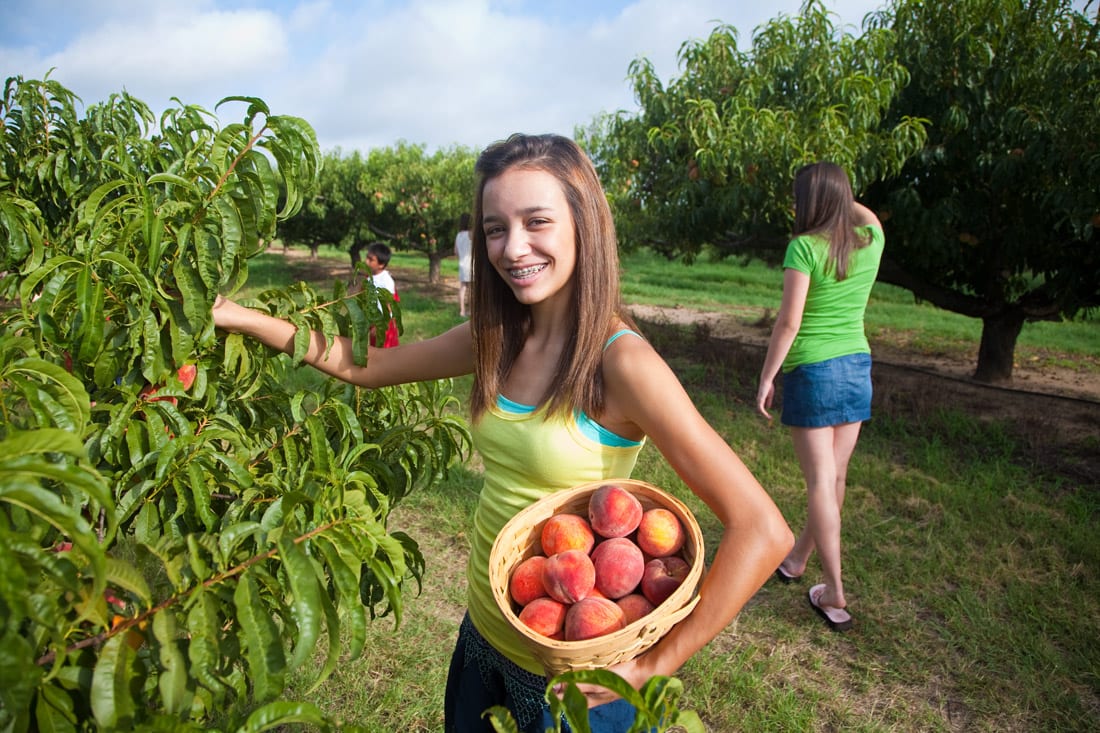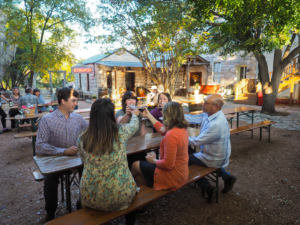The Texas Hill Country abounds with sweet peaches and more

STORY: H.M. Cauley
Georgia is the Peach State, though neighboring South Carolina produces more of them, and California grows more than those two southern states put together. So it may come as a bit of a shock to find some of the juiciest, sweetest peaches growing outside the quaint city of Fredericksburg, Texas.
Of course, this isn’t a surprise to the growers in the state’s central region, whose farms feature a variety of peaches that ripen at various times of the year. The rolling hills beyond the big-city hubbub of Austin and San Antonio are ideal for producing the fruit that’s sold by the bag and bushel at roadside stands just beyond the Fredericksburg borders. The Hill Country Fruit Council counts 18 members who are happy to hand visitors a sample and a paper towel to wipe the juice from hands and chins. They’ll also offer tours of their orchards and time to browse the merchandise that often includes bath and body products, pecans and souvenirs.
Texas peaches are so popular in the country’s second largest state that there’s no reason to ship them anywhere else. So those in pursuit of near-perfect peaches have to make the trek to Fredericksburg to taste them. They also turn up beyond the orchards on the menus at local places such as Farm Haus Bistro and the Cabernet Grill, where the chefs often incorporate them into select dishes. Peaches aren’t the only surprising edible in this area. The climate is also conducive to great grape growing, and a number of vintners along U.S. Highway 290 on either side of town are ready to give visitors tours and tastes. But don’t look just for fruity dessert drinks: These serious producers are turning out awardwinning, Old World-styled viognier, pinot grigio, petite syrah, trebbiano, tempranillo, malbec and more.

Almost as amazing as its wines and produce is the Hill Country’s history. The region was settled by German immigrants who arrived in the 1840s and left their influences on the architecture and place names. An overview of their impact is on display at the Pioneer Museum, where hundreds of artifacts show what life was like in the early days of the farming community. The 3.5-acre site features four buildings in their original locations, the most notable of which is Vereins Kirche, a replica of the town’s first public building that served as meeting house, church, school and fort.
More recent history happened in Fredericksburg in the early 1970s, when the National Museum of the Pacific War opened to commemorate the battles and honor those who fought in that area. The site debuted as the Fleet Admiral Chester Nimitz Naval Museum, named for the town’s most decorated son, who commanded the Allied Forces in the Pacific. The grounds include exhibits and artifacts housed in the old Nimitz Hotel, an 1850s structure that was expanded through the years and still boasts its most notable feature: a three-story tower in the shape of a steamboat.
Fredericksburg offers a range of other diversions, from fine dining to shopping, along with a variety of charming inns and boutique hotels. Both the Fredericksburg Herb Farm and the Cotton Gin Village, adjacent to the Cabernet Grill, offer quaint but luxuriously appointed cottages where guests can retire after lavish meals. But if you can’t wait for the heat of summer to get that sweet peach treat, know that by the end of April, local growers will have harvested seven varieties, with another nine ready for picking in May. Leave room in your carry-on to bring back a bag or two.
FREDERICKSBURG, TEXAS
visitfredericksburgtx.com
Atlanta-based writer and editor contributing to a number of local and state-wide publications. Instructor in Georgia State’s Communication department and Emory’s Continuing Education division.










